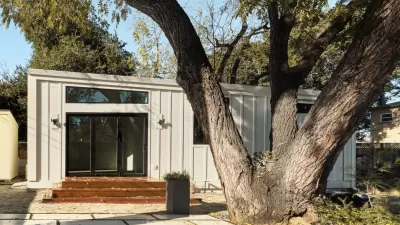Goals for low-income housing were lower in majority white cities and communities than they were in their more diverse neighbors.

A study from Berkeley's Haas Institute revealed a new wrinkle in the Bay Area's affordable housing crisis when it discovered that white communities were not planning for or setting goals for as much low-income housing as their neighboring cities.
The state of California sets housing goals by sending population estimates to regional agencies, including the Association of Bay Area Governments. "These agencies tell cities and counties how many homes are needed by income level, and local governments have to zone enough land to accommodate the new home building," Liam Dillon reports for Los Angeles Times. Cities with majority white population were not asked to build as much low income housing as more diverse cities, even when the cities had equivalent incomes.
This disparity is driven not only by the associations, but also by their constituents. "Moore, the study’s author, said the findings imply that cities in the Bay Area with larger white populations did not want such development," Dillon reports.
FULL STORY: White communities in the Bay Area have lower low-income housing goals, study finds

Planetizen Federal Action Tracker
A weekly monitor of how Trump’s orders and actions are impacting planners and planning in America.

DARTSpace Platform Streamlines Dallas TOD Application Process
The Dallas transit agency hopes a shorter permitting timeline will boost transit-oriented development around rail stations.

Congressman Proposes Bill to Rename DC Metro “Trump Train”
The Make Autorail Great Again Act would withhold federal funding to the system until the Washington Metropolitan Area Transit Authority (WMATA), rebrands as the Washington Metropolitan Authority for Greater Access (WMAGA).

Supreme Court Ruling in Pipeline Case Guts Federal Environmental Law
The decision limits the scope of a federal law that mandates extensive environmental impact reviews of energy, infrastructure, and transportation projects.

Texas State Bills to Defund Dallas Transit Die
DART would have seen a 30% service cut, $230M annual losses had the bills survived.

Bikeshare for the Win: Team Pedals to London Cricket Match, Beats Rivals Stuck in Traffic
While their opponents sat in gridlock, England's national cricket team hopped Lime bikes, riding to a 3-0 victory.
Urban Design for Planners 1: Software Tools
This six-course series explores essential urban design concepts using open source software and equips planners with the tools they need to participate fully in the urban design process.
Planning for Universal Design
Learn the tools for implementing Universal Design in planning regulations.
Roanoke Valley-Alleghany Regional Commission
City of Mt Shasta
City of Camden Redevelopment Agency
City of Astoria
Transportation Research & Education Center (TREC) at Portland State University
US High Speed Rail Association
City of Camden Redevelopment Agency
Municipality of Princeton (NJ)





























